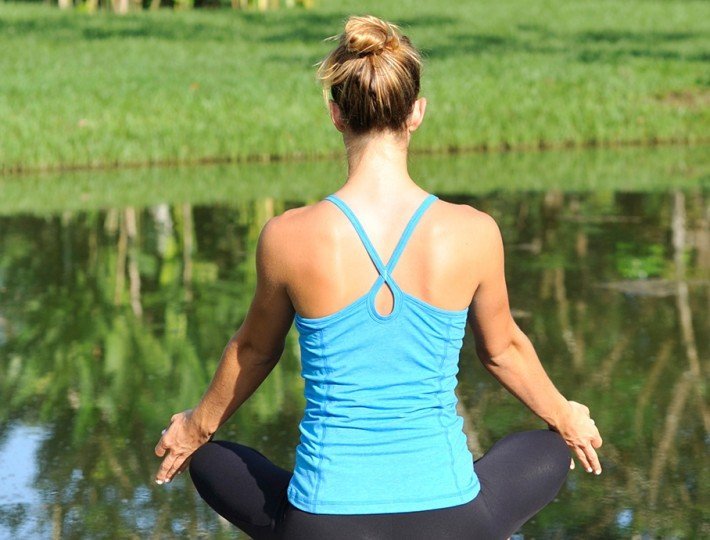Dear John,
I have always been a fearful person. How can meditation help me to overcome being afraid of living my life?
Sincerely,
Terrified
Dear Terrified,
Fear is a powerful emotion and force that all of us must work to overcome throughout our lives. Of course, fear has its proper place among our emotions and is a valuable tool for our survival. However, when it is out of sync with the actuality of the moment, it can take over our emotional experience. In such instances, fear can be detrimental to psycho-spiritual growth by causing us to shut down.
Fear, in this context, can be thought of as a turning away from presence and one’s natural capacity and responsibility to author one’s own life. It is true that much of what happens in life is beyond our personal control, but we do have such a tremendous capacity to work with how we then choose to respond and engage with our life. Therefore, it is pivotal to develop the ability to recognize fear when it is happening and then to move nearer to it and enter into a relationship with it to discover what hidden messages and teachings are within it. Therefore, as part of our psycho-spiritual development, we need to learn how to harness the power of fear and utilize it as a transformative energy.
The experience of fear can, essentially, freeze us and result in a feeling of being trapped or stuck. Therefore, the first step in moving with and through fear is to learn how to settle in to the present moment in order to “reboot” the nervous system. One direct way of engaging in settling is to connect to your breathing. Start by taking three or more really deep breaths. It is satisfying to breathe out with an audible sigh as a way to really feel the sound vibrations of letting go. Like hitting the refresh button on your web browser, breath brings the present-moment into clearer focus.
Perhaps those few breaths will unlock enough of the fear so that you may feel more able to move forward with an inquiry into the nature of the fear. Fear is typically experienced in a multi-dimensional way. We can feel it physically, emotionally, and cognitively in the sense that it distorts thinking and biases it toward survival mode, which is more limited and condensed than when we are optimally functioning and, therefore, utilizing the full range of executive function.
Related: Letting Go of Your Fears Through Movement
The next step in the inquiry is to enter more completely in contemplation through one of these portals (mind, body, emotions). For example, in meditation, you can invite the fear in closer and let yourself inhabit it in order to spend a few quality minutes getting familiar with the physical sensations of it. You may notice a kind of shuddering feeling, or a tightness, or tension in your body. You may feel uneasy or on edge. Remind yourself that this is part of the experience. If at any time the experience becomes too much, I recommend shifting back out and engaging in deep breathing and other coping tools that have previously helped you to come back from the fear. Getting overwhelmed in the practice is also a good sign to seek more professional support and guidance from a therapist or qualified meditation teacher. You can explore your thoughts and emotions in a similar way.
The key and challenge here will be to maintain your sense of an observer self, which means to not get caught in your own stream of thoughts. You need to be able to maintain an objective stance so that you can learn from your thinking process rather than be swept away in it. The same is true for emotions, you may notice that in sitting with fear, other emotions may also come, such as worry, loneliness, terror, or on the other side, you may discover that fear has more friendly relatives such as curiosity, wonder, or even a sense of relief. Relief may surface perhaps due to allowing the fear some space to breathe rather than being immediately squelched.
As you sit with fear over time, eventually you will form a new friendship with it and recognize it as a teacher and source of strength. You will learn to dis-identify from any negative grasp it has on you and take a step back in order to bear witness to it’s fruitfulness.
In working with challenging emotions, such as fear, we have to remember that the path of meditation is one of listening, looking, sensing, feeling, and opening oneself, one’s heart, up to the inherent possibilities that are waiting to be born in each moment. When we get caught in negative energies, such as fear, we lose our sense of connection to this birthing process.
Therefore, when fear strikes, in addition to the more formal practices, such as breathing and contemplation, we have to remember to embody our humanness by pushing pause and deliberately slowing everything down.
Slowing down creates space to connect to the ever-present grace that surrounds us and always embraces us. This may sound like a spiritual view, but it doesn’t have to be. Connecting to grace can simply be an act of pausing and looking all around you in your ordinary surroundings and recognizing that we are all human beings, members of this human tribe, with similar struggles and joys, and we all make this earth our home.
Even our animal relatives struggle with certain inevitability like we do. Therefore, when we actually look, we can see that there is connection everywhere. We have to once again remember to ground ourselves to our mother earth and feel the beautiful connection of our feet to this ever dynamic and sacred ground and to breathe that connection up through our bodies and also feel into our immense connection to our father sky above. By taking pause and reconnecting in this way we are opening up to the kind of special spaciousness that can liberate us from fear.
Another beautiful way of working with fear is offering to ourselves a few phrases of metta, or loving-kindness meditation. Over the years, a few simple phrases that I have gravitated toward are:
May I be safe
May I be happy
May I be well
May I be healthy
May I be healed
May I be free from all worry
May I be free from all fear
May I be free from all suffering
May all beings be free from suffering
You can take your time, sit quietly, with your hands on your heart, and offer these phrases several times over toward yourself. It is helpful to visualize yourself, as if you were looking into a mirror reflecting a beautiful radiant healing energy toward you.
I thank you for writing in with this incredibly valuable question and I wish you the best in your journey toward embracing and transforming fear.
Many blessings,
John











Comments (0)